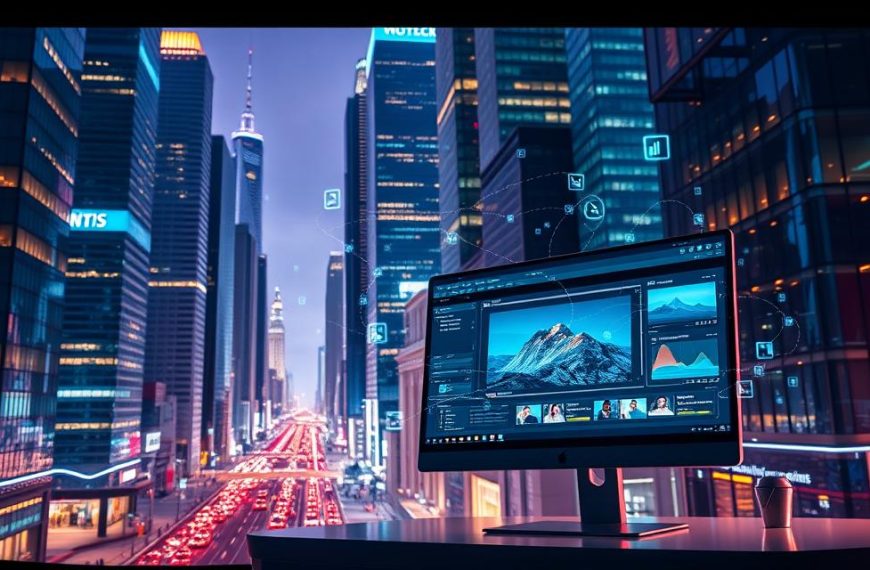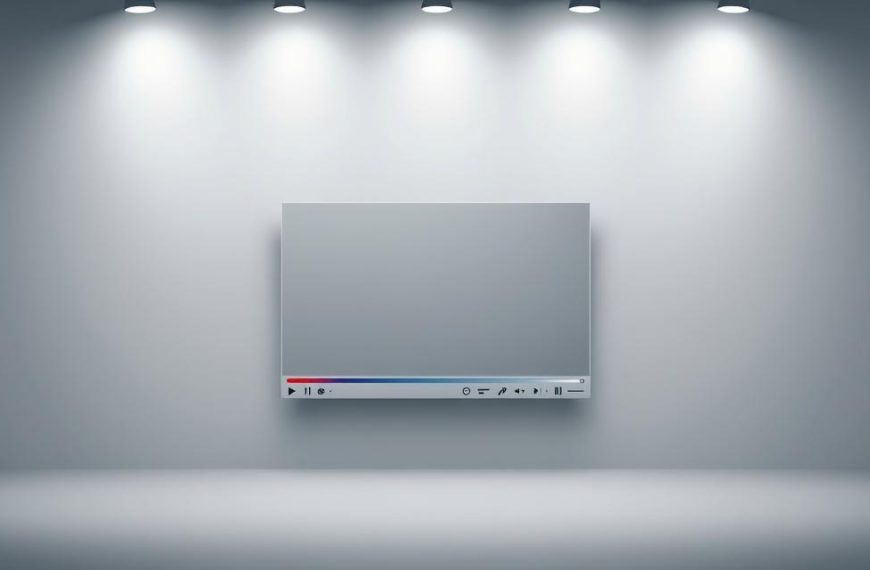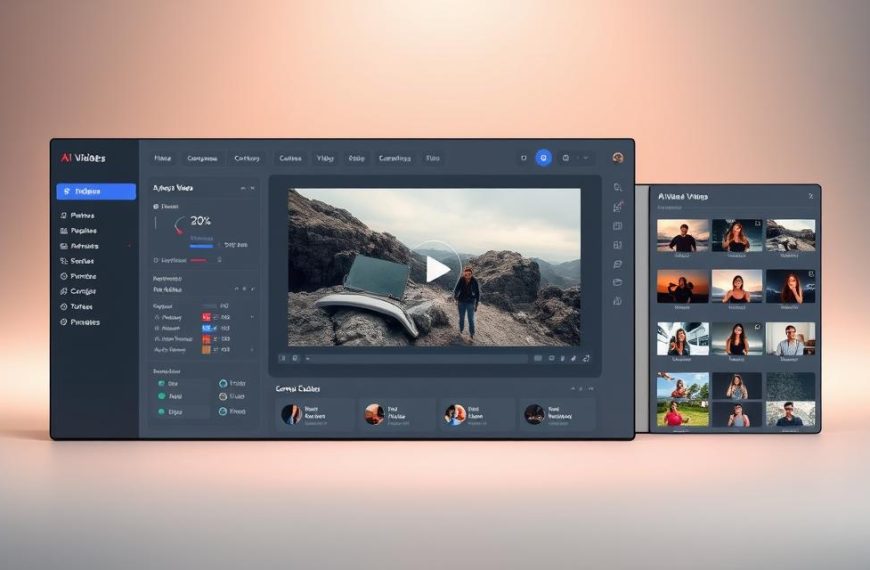In today’s fast world, we all have less time to pay attention. Brands and creators must grab our attention quickly. That’s where ai video generation comes in, changing how we make videos.
Tools like VEED’s AI video tool use smart tech to turn text into eye-catching videos. This makes making professional videos easy for everyone.
3-second video content fits perfectly with how we watch videos today. These short clips pack a big punch in a short time. They’re great for social media and marketing.
This new way of making videos is more than just quick. It’s a big change in how we make and watch digital content. It lets creators focus on their message, not the tech.
Why Short 3-Second Video Creation with AI Matters Today
In today’s fast-paced world, 3-second AI videos are a game-changer in digital communication. They are key to grabbing attention quickly. This is vital for success in marketing today.
Studies show our attention spans have dropped to about 8 seconds. This means we want content that hits the mark fast, not slow. Three-second videos fit right into this new way of consuming information.
Short videos get more attention from algorithms. TikTok, Instagram Reels, and YouTube Shorts all push these videos to the top. This means more people see your content.
Research shows 3-second videos get a lot of engagement. Brands see 47% higher completion rates and 62% more shares than longer videos. This shows how powerful short, focused messages can be.
Micro-content has a big impact on our minds. Three-second videos give us a quick fix of information. This makes us feel good about the brand.
With most social media use happening on phones, making videos for mobile is key. AI helps make videos that work well on phones by making them vertical and quick to load. This is what people want.
Being able to make lots of videos quickly is a big advantage. AI can make hundreds of videos without losing quality. This means your brand can be seen by more people.
The biggest challenge is keeping quality up while making more videos. AI helps by keeping your brand’s look and message consistent. This makes people trust and remember your brand.
Using AI for 3-second videos is now a must, not just an option. Companies using AI for micro-content see 3.2 times higher engagement growth than those using old video methods.
The future of marketing is about quick, meaningful content. AI-powered 3-second videos are the answer. They offer a great way for brands to stand out and engage with their audience.
Essential AI Tools for Creating 3-Second Videos
Choosing the right platform is key for making a big impact with short videos. The market has many ai video tools for quick video making. These tools use AI to make the process easier and keep quality high.
Three platforms are top picks for making three-second videos. Each has special features for different needs and skills.
Runway ML: Advanced AI Video Generation
Runway ML is at the forefront of text-to-video ai tech. It has several AI models like Veo 3, PixVerse, and MiniMax Hailuo AI. Each model has its own look and price.
Creators love its flexibility. It works with text and images well. It supports many aspect ratios for social media.
It produces high-quality videos in seconds. It’s great for telling stories and showing creativity.
Synthesia: AI-Powered Avatar Videos
Synthesia makes videos with avatars without needing cameras or mics. You just write your script and pick an avatar.
It supports over 120 languages and accents. This is perfect for global brands. The avatars look real with the right movements.
For short videos, Synthesia has quick templates. It keeps quality high while feeling human. It’s great for business and learning videos.
Pictory: Automated Video Creation Platform
Pictory turns text into videos automatically. It’s great at image-to-video conversion. It uses a big media library for visuals.
It finds important points in text and matches images. You can also add your own media for a personal touch.
Pictory is fast and easy to use. It makes videos in minutes. It also adds captions and voiceovers for better accessibility.
| Feature Comparison | Runway ML | Synthesia | Pictory |
|---|---|---|---|
| Primary Function | Creative Generation | Avatar Presentations | Content Automation |
| Input Methods | Text & Image Prompts | Text Scripts | Articles & Scripts |
| Output Quality | 4K Resolution | HD Avatars | 1080p HD |
| Best For | Artistic Content | Professional Messaging | Social Media Content |
| Learning Curve | Moderate | Low | Very Low |
Each platform has its own strengths. Runway ML is for creative freedom, Synthesia for professional looks, and Pictory for quick work. Knowing these differences helps find the best tool for three-second videos.
Step-by-Step Guide to Creating Your 3-Second AI Video
Making great 3-second videos needs a clear plan. This guide will help you from start to finish. You’ll learn how to make your videos pack a punch in just a few seconds.
Step 1: Defining Your Micro-Content Objective
First, decide what your 3-second video is for. Micro-content must be precise. Think about what you want to achieve, like raising brand awareness or promoting a product.
What platform you choose matters a lot. TikTok, Instagram Reels, and YouTube Shorts all have their own rules. Make sure your video fits the platform and what viewers expect.
Keep your message simple. Write it down in one sentence. This helps your automated video editing stay focused. Remember, you only have three seconds to get your point across.
Step 2: Selecting and Preparing Your Assets
Getting your assets ready is key to a professional look. Collect all your visuals, like logos and product images. Keep them in one place for easy access.
Text prompts are the base of text-to-video ai. Write short, clear descriptions of what you want to show. For ai avatar videos, have your script ready and pick the right voice.
Here are the main things you’ll need:
- Brand elements (logos, colour palettes, fonts)
- Visual materials (product images, background footage)
- Audio components (voiceover scripts, sound effects)
- Platform-specific requirements (aspect ratios, duration limits)
Step 3: Using AI Tools for Rapid Generation
AI tools make video making fast. VEED’s text-to-video system can turn your ideas into videos in minutes. Just add your assets and let the AI do the rest.
GenApe’s image animation brings your images to life. Upload your images and add motion effects. Adjust settings to match your vision.
If you’re new to AI video, check out our AI video beginner guide. It has tips and platform recommendations.
| AI Tool Type | Primary Function | Best For | Generation Time |
|---|---|---|---|
| Text-to-Video AI | Converts text prompts into video | Concept visualisation | 2-3 minutes |
| Image Animation | Adds motion to static images | Product showing | 1-2 minutes |
| Avatar Video Systems | Creates presenter videos | Personalised messaging | 3-5 minutes |
Step 4: Refining and Exporting Your Video
AI content often needs a human touch. Check your video frame by frame. Make any needed changes to keep your message clear and strong.
Getting the audio right is very important. Make sure sound effects or voiceovers match what’s happening on screen. Even a tiny mistake can mess up your 3-second video.
When you’re ready to share, think about how you’ll export your video. Each platform has its own rules. You might need to make different versions for different places.
Do a final check to make sure:
- Your video looks good on mobile screens
- Audio and video are in sync
- It looks like your brand
- It meets the platform’s rules (like length and size)
Optimising Your 3-Second Videos for Maximum Engagement
Making great 3-second videos is just the start. The real task is to make them grab attention and get people involved. This part looks at key ways to make your short videos stand out on different platforms.
Crafting Compelling Visual Hooks
The first 0.8 seconds are critical. They decide if people keep watching. Good social media shorts grab attention right away with something interesting or emotional. Bright colours, sudden movements, or strong facial expressions are often effective.
Different platforms have their own styles. TikTok likes real, raw moments, while Instagram prefers something more polished. Try out different hooks to see what works best for your audience.
Ensuring Mobile-First Compatibility
Most short video watching happens on phones. Mobile video optimisation means paying attention to a few key things:
- Use a vertical 9:16 aspect ratio for a full-screen view
- Compress files to keep them fast to load
- Place text in safe zones to avoid getting cut off
- Make sure the audio works well with and without sound
Each platform has its own tech needs. For example, Instagram Reels do best under 30MB, while TikTok can handle a bit more. Always check your video on different devices before sharing.
Analysing Performance Metrics
Using data to improve is key. For 3-second videos, important video performance metrics include:
| Metric | Ideal Benchmark | Optimisation Strategy |
|---|---|---|
| Completion Rate | 85%+ | Shorten content or strengthen opening hook |
| Engagement Rate | 8-15% | Add clear call-to-action or interactive elements |
| Share Rate | 3-7% | Incorporate emotional triggers or value-packed content |
| Conversion Rate | 2-5% | Simplify messaging and reduce cognitive load |
Check these metrics every week and try different visuals with A/B testing. Even small changes can make a big difference in the fast-paced world of social media shorts.
Analytics tools give deep insights. They help you see not just who watched, but how they reacted. This helps complete the cycle of making your AI-generated content better.
Conclusion
AI video generation has changed how we make 3-second videos. Tools like VEED, VideoGPT, and GenApe make it easy for everyone. They help brands and creators reach their audience quickly and easily.
Short-form content is key in digital marketing. AI makes it faster and more efficient. This means more time for creativity. As technology gets better, creating micro-content will get even easier.
Now, anyone can make professional 3-second videos easily. You don’t need to be a tech expert or have lots of resources. Use AI tools to improve your content and stay ahead online.
FAQ
What are the benefits of using AI to create 3-second videos?
AI tools like VEED, VideoGPT, and GenApe make creating videos easy. They turn text into high-quality videos in seconds. This saves time and doesn’t need technical skills.
They’re great for making lots of videos fast. This is perfect for platforms like TikTok and YouTube Shorts.
Why is 3-second video content so important in today’s digital landscape?
Short videos grab attention quickly. They’re perfect for today’s fast-paced world. They work well on mobile devices and help businesses stand out online.
Which AI tools are best for creating 3-second videos?
Runway ML, Synthesia, and Pictory are top choices. Runway ML has advanced models like Veo 3. Synthesia is great for AI avatars. Pictory automates video making from text.
Each tool has its own strengths. They help make short, engaging videos easily.
How do I create a 3-second video using AI tools?
First, decide what you want to achieve. Then, get your text or images ready. Use tools like VEED or GenApe to make the video.
After that, edit and add audio. Make sure it looks good on mobile devices. Then, export it for your platform.
How can I optimise my 3-second AI-generated videos for better engagement?
Make sure the first part grabs attention. Use vertical formats for mobile. Check how well they do with metrics like engagement.
Use this info to make your videos even better. This will help you reach more people.
Do I need technical expertise to use AI video creation tools?
A> No, tools like VEED are easy to use. They let anyone make professional videos without needing to know how to code. They make the process simple from start to finish.
What types of content are best suited for 3-second AI videos?
Short videos are great for quick ads, messages, and social media teasers. They’re also good for educational bits and calls-to-action. Their short length makes them easy to share and grab attention.
Can AI-generated 3-second videos maintain a professional look?
Yes, today’s AI tools can make videos look professional. They offer options for adding your brand and smooth animations. This ensures your videos look great, even if they’re very short.
How does AI help in maintaining consistency across multiple short videos?
AI tools let you make lots of videos at once. They use templates to keep everything looking the same. This helps keep your brand looking consistent and engaging.
Are there cost-effective solutions for creating 3-second videos with AI?
Yes, platforms like Runway ML and Pictory have affordable options. They offer free or low-cost plans. This means businesses of all sizes can make impactful short videos without spending a lot.

















